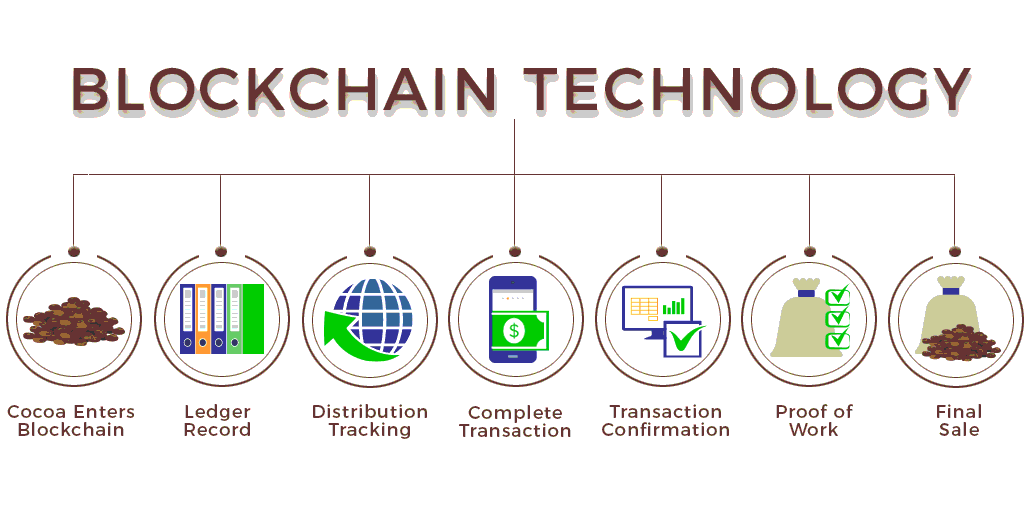
Blockchain Technology
Cocoa is a key ingredient in the global chocolate industry, but its supply chain is often plagued by issues such as deforestation, child labour, and unethical sourcing. With increasing consumer demand for transparency and sustainability, the need for traceability has never been greater. Blockchain technology offers a robust solution by providing an immutable, decentralized, and transparent ledger that records every transaction within the cocoa supply chain.
As the global chocolate industry continues to evolve, major brands and regulatory bodies are recognizing the importance of traceability. Governments are enacting stricter regulations on ethical sourcing, and consumers are actively seeking assurance that the products they purchase are sustainably sourced. Blockchain technology, with its ability to provide verifiable and tamper-proof records, is becoming a crucial tool in meeting these demands and fostering a more ethical cocoa supply chain.
Understanding Blockchain Technology
Blockchain is a distributed ledger technology that enables secure and transparent transactions without intermediaries. Each transaction is recorded in a block, which is linked to the previous block, forming a chain. The decentralized nature of blockchain ensures that records cannot be altered or deleted, making it a powerful tool for ensuring trust and accountability in supply chains.
Unlike traditional databases that rely on a central authority, blockchain operates on a peer-to-peer network where all participants have access to the same verified information. This decentralization reduces the risk of fraud and data manipulation while enhancing overall security. The use of cryptographic techniques ensures that data remains tamper-proof, fostering a high level of reliability and trust in the supply chain.
Additionally, blockchain technology allows for interoperability with other digital solutions, such as IoT sensors and QR codes, further strengthening traceability efforts. These integrations enable real-time data collection, providing stakeholders with instant access to critical supply chain information.
Challenges in Cocoa Supply Chains
Traditional cocoa supply chains are often opaque, making it difficult to track the journey of cocoa beans from farms to chocolate manufacturers. Some of the key challenges include:
- Lack of transparency: Many cocoa farmers operate in remote regions with limited access to digital tools, leading to gaps in supply chain visibility.
- Ethical concerns: Issues such as child labour and poor working conditions persist due to the lack of oversight.
- Counterfeit products: Adulteration and mislabeling of cocoa products undermine the integrity of the industry.
- Environmental impact: Illegal deforestation for cocoa farming continues to be a significant environmental concern.
How Blockchain Enhances Traceability
Blockchain technology addresses these challenges by enabling end-to-end traceability in cocoa supply chains. Key benefits include:
1. Improved Transparency and Accountability
Blockchain records every transaction, from the harvesting of cocoa beans to their processing, transportation, and final sale. This ensures all stakeholders, including farmers, suppliers, manufacturers, and retailers, have access to accurate and real-time information.
2. Verification of Ethical Sourcing
Through blockchain, consumers can verify whether cocoa beans are sourced ethically and sustainably. Smart contracts can automate compliance with fair trade and labor laws, ensuring that only legally sourced cocoa enters the supply chain.
3. Fraud Prevention and Product Authentication
Each batch of cocoa beans can be assigned a unique digital identifier stored on the blockchain. This prevents counterfeiting and ensures that only authentic, high-quality cocoa reaches manufacturers and consumers.
4. Enhanced Efficiency and Cost Reduction
Traditional supply chain documentation involves extensive paperwork and manual tracking, which can lead to delays and inefficiencies. Blockchain automates record-keeping, reducing administrative costs and improving operational efficiency.
Real-World Applications
Blockchain technology is already being applied in various sectors, including agriculture and food supply chains. Its ability to ensure transparency, security, and efficiency has made it a game-changer for ethical sourcing. In the cocoa industry, blockchain is being leveraged by companies and organizations to enhance traceability and improve working conditions for farmers.
Several organizations are already leveraging blockchain to enhance cocoa traceability:
- IBM Food Trust has partnered with major chocolate brands to use blockchain for tracking cocoa sourcing.
- Tony’s Chocolonely, a chocolate company committed to ethical sourcing, employs blockchain to verify its fair trade claims.
- The Ghana Cocoa Board is exploring blockchain technology to improve transparency and farmer incomes in the country’s cocoa industry.
Blockchain Solutions for Cocoa Traceability
Several blockchain-based software solutions are actively improving traceability in cocoa supply chains. These platforms help ensure transparency, ethical sourcing, and efficiency:
- MiCacao – A digital traceability tool that allows cocoa producers to showcase sustainable, deforestation-free cocoa while improving supply chain transparency.
- TraceX – A blockchain-based solution that records each step in the cocoa supply chain, verifying ethical sourcing and fair trade compliance.
- Open Food Chain – A blockchain initiative providing end-to-end visibility to prevent fraud and improve sustainability in cocoa farming.
- COCOBLOCK – A project focused on improving traceability in the Ivorian cocoa sector, raising awareness about blockchain adoption for supply chain efficiency.
These platforms highlight the growing role of blockchain in ensuring ethical and sustainable cocoa production.
The Future of Blockchain in Cocoa Supply Chains
While blockchain presents a promising solution, its adoption faces challenges such as high implementation costs, the need for technological literacy among small-scale farmers, and interoperability with existing supply chain systems. However, as more stakeholders recognize its benefits, investment in blockchain infrastructure and education is expected to grow.
Blockchain technology is revolutionizing cocoa supply chains by ensuring transparency, ethical sourcing, and efficiency. As consumer demand for responsible chocolate production increases, blockchain will play a crucial role in fostering a sustainable and trustworthy cocoa industry. By leveraging blockchain, companies can not only enhance traceability but also contribute to the well-being of cocoa farmers and the environment.

